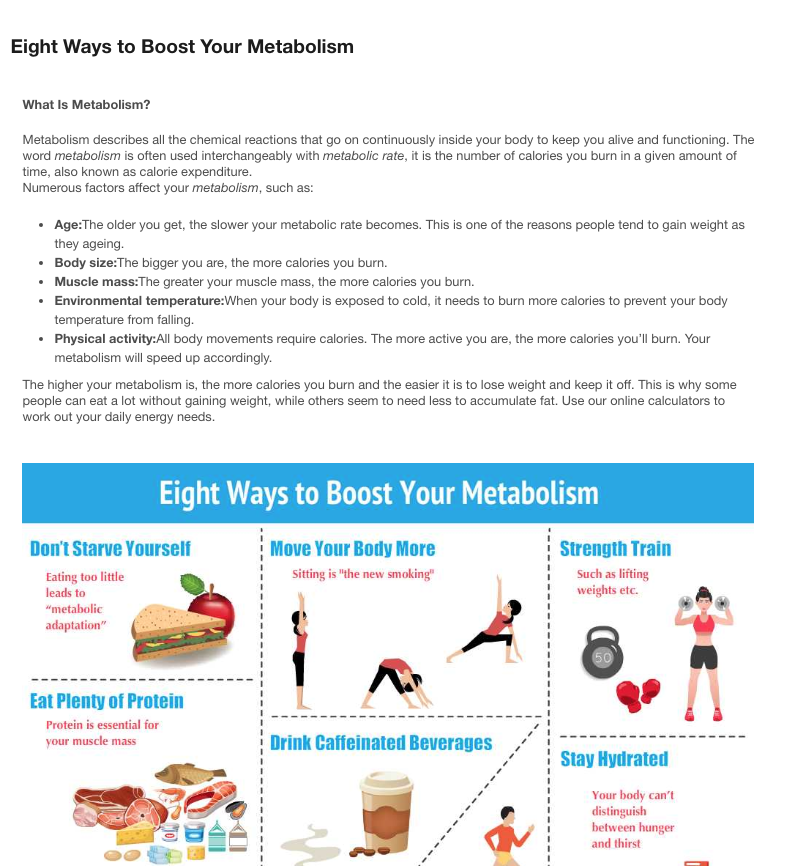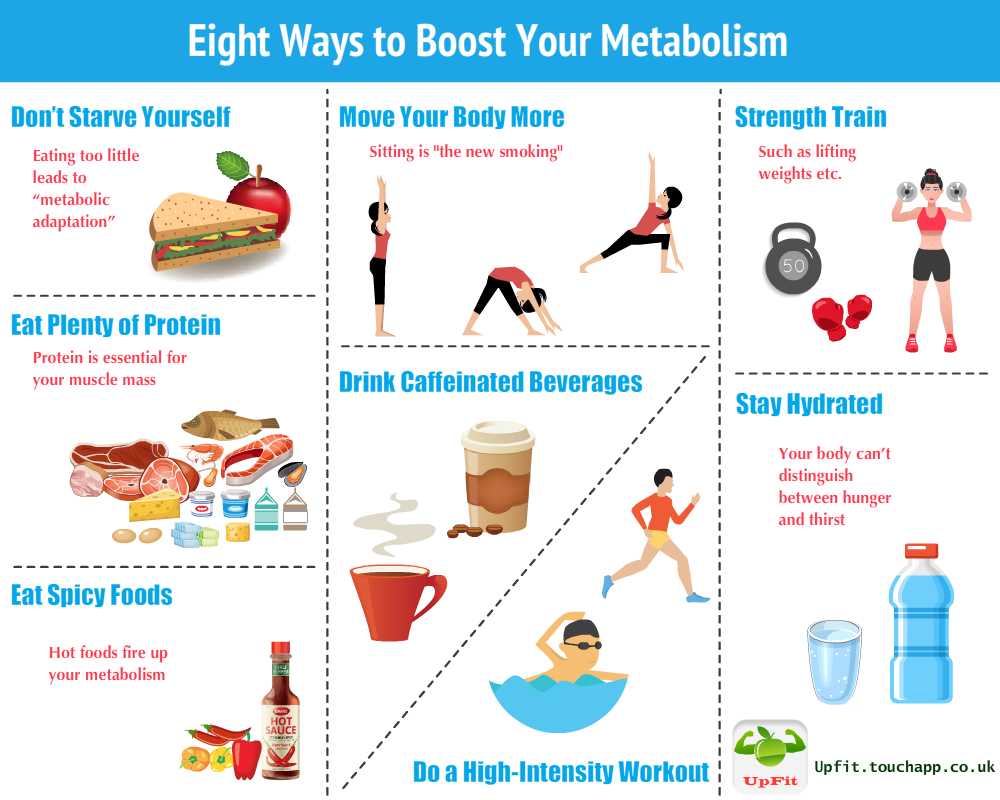What Is Metabolism?
Metabolism describes all the chemical reactions that go on continuously inside your body to keep you alive and functioning. The word metabolism is often used interchangeably with metabolic rate, it is the number of calories you burn in a given amount of time, also known as calorie expenditure.
Numerous factors affect your metabolism, such as:
- Age:The older you get, the slower your metabolic rate becomes. This is one of the reasons people tend to gain weight as they ageing.
- Body size:The bigger you are, the more calories you burn.
- Muscle mass:The greater your muscle mass, the more calories you burn.
- Environmental temperature:When your body is exposed to cold, it needs to burn more calories to prevent your body temperature from falling.
- Physical activity:All body movements require calories. The more active you are, the more calories you’ll burn. Your metabolism will speed up accordingly.
The higher your metabolism is, the more calories you burn and the easier it is to lose weight and keep it off. This is why some people can eat a lot without gaining weight, while others seem to need less to accumulate fat. Use our online calculators to work out your daily energy needs.
Ways to increase your metabolism.
Effective weight loss programs require strategically speeding up your metabolism. Here are eight most effective ways of burning calories:
- Don’t Starve Yourself
While eating less is a key weight loss method, eating too little is usually counterproductive in the long term. Restricting food causes a decrease in your metabolic rate, or the number of calories burned. This effect is known as the “metabolic adaptation” or “starvation mode”. Your body responds by slowing your metabolic rate in order to hold on to existing energy stores. What’s worse, if the food shortage continues, you’ll begin burning muscle tissue, and research shows a significant drop in metabolic rate that’s sustained after the weight loss diet is over.
- Eat Plenty of Protein
Eating adequate amounts of protein is essential if you want to build or maintain your muscle mass. All food can temporarily increase your metabolism rate, known as the thermic effect of food (TEF). It’s caused by the extra calories required to digest, absorb and process the nutrients in your meal. Protein increases metabolic rate by 20–30%, whereas carbs and fat cause a 3–10% increase or less. Eating high amounts of protein can also help counteract the loss of muscle mass and slowdown of metabolic rate associated with weight loss.
- Move Your Body More
Sitting is regarded as “the new smoking”. Try to make activity part of your daily routine. That could include walking or cycling all or part of your journey to work. You could also take the stairs instead of the lift. All body movement burns calories. The more active you are, the higher your metabolic rate becomes. Regular exercise is highly recommended for anyone who wants to lose weight or improve his or her health.
- Do a High-Intensity Workout
High-intensity interval training (HIIT) involves quick and very intense bursts of activity, such as sprints or fast push-ups. Research showed HIIT is the most effective forms of exercise and can help you burn fat by increasing your metabolic rate, even after your workout has finished — an effect dubbed as the “after burn”.
- Strength Train
Strength train is another excellent way to speed up your metabolic rate and promote the growth of muscle mass. A calorie-reduced, weight loss diet often leads to the loss of muscle mass and drops in metabolic rate, regular strength exercise can partially counteract this adverse effect. Examples of muscle-strengthening activities include lifting weights and high-intensity bouts of exercise.
- Drink Caffeinated Beverages
Caffeine is a central nervous system stimulant, studies have shown that the caffeine in coffee and tea can increase metabolism rate by 3–11%. Tea and coffee also help convert some of the fat stored in your body into free fatty acids, which may increase fat burning and be good for both weight loss and weight maintenance. The metabolism-boosting properties of caffeinated beverages will help prevent the dreaded weight loss plateau caused by the decrease of metabolism.
- Eat Spicy Foods
Capsaicin, a substance that gives chili peppers their mouth-searing quality, can also fire up your metabolism. One study demonstrated consuming one tablespoon of chopped red or green chilies can temporarily boosts your body’s production of heat and the activity of your sympathetic nervous system about 23%. You may start to keep a jar of red pepper flakes on hand for topping pastas, pizzas and stir-fries.
- Stay Hydrated
All of your body’s chemical reactions, including your metabolism, depend on water. Many studies show that drinking water leads to a temporary increase in metabolism rate, an effect known as water-induced thermogenesis. Cold water has an even greater effect than warm water, as your body needs to use energy to heat it up to body temperature. Dehydration not only reduces your metabolism and your body can’t distinguish between hunger and thirst, you probably end up eating more than you need.
Follow us on Twitter: @funnybies_uk



